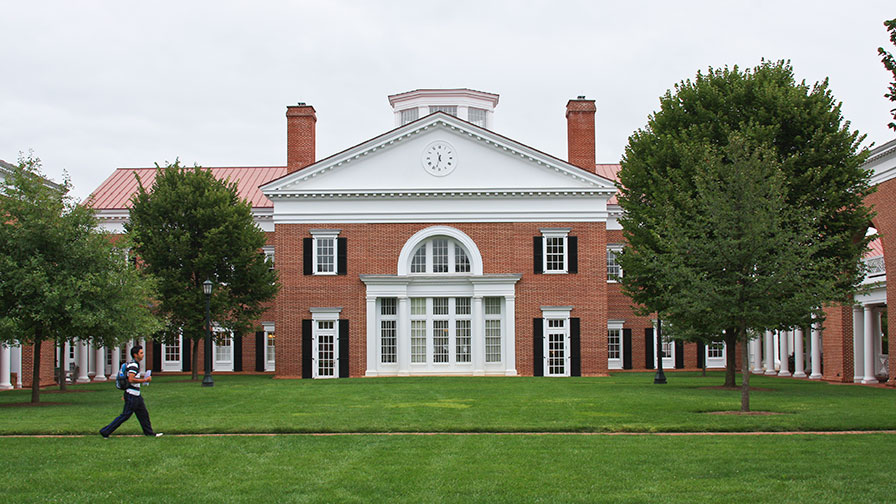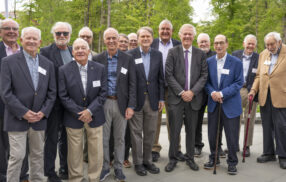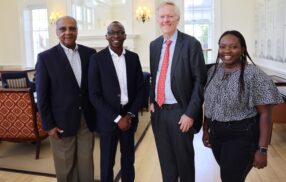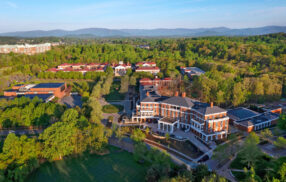
Jefferson Innovation Summit for the Commonwealth Explores the Local Entrepreneurial Ecosystem
If you were the mayor of Dominion — a vibrant city that just lost one of its largest employers — how would you make sure that aspiring entrepreneurs stayed in your community? If you were a business or university leader in Dominion, what would be your role in nurturing and sustaining an environment in which new-business ideas could thrive?
During the Jefferson Innovation Summit for the Commonwealth, held at the University of Virginia Darden School of Business on 7 September 2012, more than 60 business, government and academic leaders from across Virginia and the region participated in a rich discussion about these and other questions, moving from a hypothetical case-study scenario to a lively brainstorming session, which yielded concrete ideas for state and local policy.
“The people in this room are the ones who can take bold ideas about how best to create a robust entrepreneurial ecosystem and move them forward,” said Sean D. Carr of Darden’s Batten Institute for entrepreneurship and innovation.
The event was hosted by the Batten Institute in partnership with the Office of the Governor of Virginia, and was sponsored by Amazon Web Services, Dominion, Northrop Grumman and Lockheed Martin. It built upon last year’s inaugural Jefferson Innovation Summit, in which national and international leaders convened to discuss how to improve innovation capacity and the entrepreneurial environment in the United States.
During her opening remarks to this year’s summit delegates, U.Va. President Teresa Sullivan, an expert in labor demography, said that Virginia’s good business environment could improve through increased collaboration. She pointed to the Commonwealth Center for Advanced Manufacturing, a consortium of corporate and university members that facilitates technology transfer, as a model.
Collaboration was also a central theme of the summit’s case study discussion, led by Darden Professor Greg Fairchild. During the dialogue, Fairchild asked participants to consider the hypothetical Dominion City scenario, which involved many different local players building an entrepreneurial ecosystem. He also shared the story of a cocktail party encounter between Max, an academic researcher growing synthetic meat in a petri dish, and David, a manager of an auto repair company who wants to adapt the innovation to produce bio-engineered tires.
“The true measure of an entrepreneurial ecosystem is whether someone like David could start a company,” said Toan Nguyen (MBA ’94), co-founder and CEO of C’ville Coffee, a Charlottesville coffee shop. The key, many delegates noted, is finding opportunities for people like Max to meet people like David, and for the Davids of the world to build connections with many kinds of mentors and advisers. “You need ways to mix it up,” said Ted Zoller, the director of the Center for Entrepreneurial Studies at the University of North Carolina at Chapel Hill.
Some delegates spoke of the importance of coffee shops and other informal spots for encouraging serendipitous interactions. Karen Booth Adams, the CEO of Richmond-based Hot Technology Holdings, highlighted the role of academic institutions: “The university is a convener; it can bring together the Maxes and the Davids.”
The case study raised many issues that delegates brought to the Summit’s brainstorming session: the need for efficient capital formation — an issue stressed by U.S. Congressman Robert Hurt — and tax incentives, IP protection, talent identification in K-12 education, the role of large companies, incentive systems for academic researchers and the many ingredients of an entrepreneur-friendly culture.
In the coming weeks, the delegates’ ideas and suggestions will be assembled into a “policy playbook” that will be distributed to Virginia policymakers, business leaders and other stakeholders in the commonwealth and beyond.
Michael Lenox, executive director of the Batten Institute, called on the delegates to consider the long-term effects of their efforts. “Creating a vibrant entrepreneurial ecosystem is not a one-year project; it’s not a five-year project. It’s a 20-year project.”
Governor Bob McDonnell, who has designated 2012 as the Year of the Entrepreneur, addressed the delegates at the close of the summit, noting that small businesses account for 71 percent of all new jobs in the commonwealth. He is looking forward to the 2013 legislative session, he said, as a forum for exploring new ways to encourage business creation.
The University of Virginia Darden School of Business prepares responsible global leaders through unparalleled transformational learning experiences. Darden’s graduate degree programs (MBA, MSBA and Ph.D.) and Executive Education & Lifelong Learning programs offered by the Darden School Foundation set the stage for a lifetime of career advancement and impact. Darden’s top-ranked faculty, renowned for teaching excellence, inspires and shapes modern business leadership worldwide through research, thought leadership and business publishing. Darden has Grounds in Charlottesville, Virginia, and the Washington, D.C., area and a global community that includes 18,000 alumni in 90 countries. Darden was established in 1955 at the University of Virginia, a top public university founded by Thomas Jefferson in 1819 in Charlottesville, Virginia.
Press Contact
Molly Mitchell
Associate Director of Content Marketing and Social Media
Darden School of Business
University of Virginia
MitchellM@darden.virginia.edu





